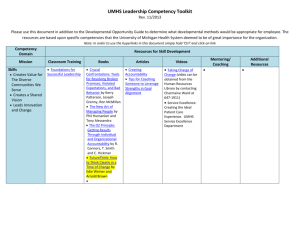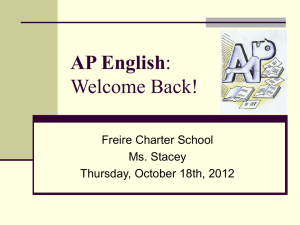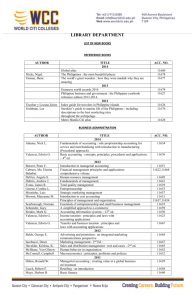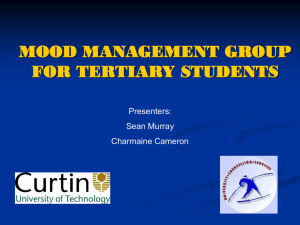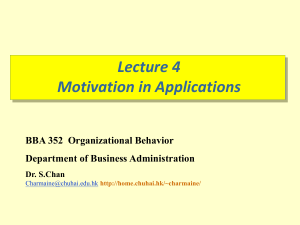www.XtremePapers.com Cambridge International Examinations 9695/73 Cambridge International Advanced Subsidiary and Advanced Level
advertisement
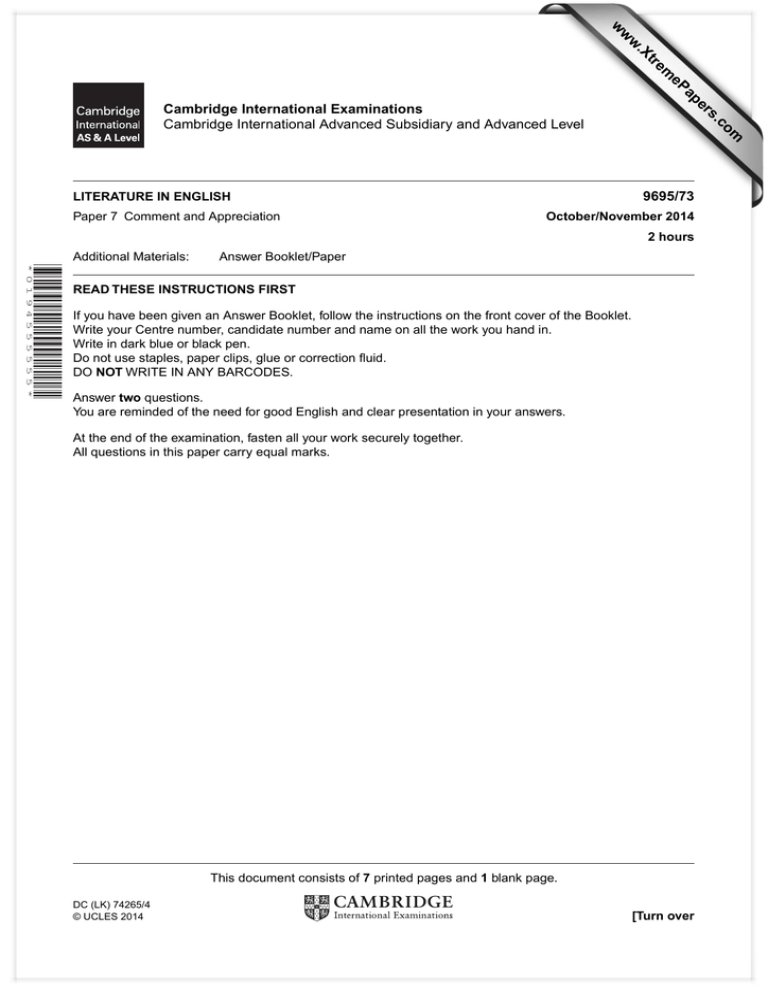
w w om .c s er 9695/73 LITERATURE IN ENGLISH Paper 7 Comment and Appreciation ap eP m e tr .X w Cambridge International Examinations Cambridge International Advanced Subsidiary and Advanced Level October/November 2014 2 hours Additional Materials: Answer Booklet/Paper * 0 1 9 4 5 5 5 5 5 5 * READ THESE INSTRUCTIONS FIRST If you have been given an Answer Booklet, follow the instructions on the front cover of the Booklet. Write your Centre number, candidate number and name on all the work you hand in. Write in dark blue or black pen. Do not use staples, paper clips, glue or correction fluid. DO NOT WRITE IN ANY BARCODES. Answer two questions. You are reminded of the need for good English and clear presentation in your answers. At the end of the examination, fasten all your work securely together. All questions in this paper carry equal marks. This document consists of 7 printed pages and 1 blank page. DC (LK) 74265/4 © UCLES 2014 [Turn over 2 1 Write a critical commentary on the following extract from the play Children of Asazi (1985), by Matsemela Manaka. Alexandra is a South African township which is being cleared and rebuilt against the wishes of the people living there. Diliza is a supporter of the Save Alexandra Campaign and is talking to his friend Charmaine. Diliza: Charmaine: Diliza: Charmaine: Diliza: Charmaine: Diliza: Charmaine: Diliza: Charmaine: Diliza: Charmaine: Diliza: Charmaine: Diliza: Charmaine: Diliza: Charmaine: Diliza: Charmaine: Diliza: Charmaine: Diliza: Charmaine: Diliza: Charmaine: Diliza: Charmaine: Diliza: © UCLES 2014 Hallo love! Hallo. I am sorry to keep you waiting. You don’t look sorry. Are you coming to the meeting this afternoon? What meeting? The Save Alexandra Campaign Meeting. When are you going to have time for me? These are tough times, Charmaine. Alexandra can’t just fade away because of our love dreams. Our love must be like everything else. It must take up the fight for Alexandra. [Pause] What must I do to make you understand? Give up Alexandra! Impossible. Then you don’t love me. I see. [After a pause] I don’t want to lose you, Diliza. So I get lost that easy neh? I also don’t want to lose you, Charmaine. Nor do I want to give up Alexandra. The cause for Alexandra is for all of us. If it is for all of us, why are you always in the frontline like a little dog? There can never be a meeting here in Alexandra, Tembisa or in Soweto without you on the agenda. Are you in a beauty contest or what? Yah! It’s a competition. A debate is not a competition. Still, these debates are far from the man in the street. Diliza, your words are flowers without roots. When are you going to sit down and think? Think with and for the community? Sometimes you can talk sense. And sometimes? Rubbish! [Pause] This conversation is all mixed up. Some sense and some rubbish. That’s because everything about our lives is mixed up! [Enter MABU] Look at that mess. He is not a mess. He is part of the evidence. He needs a home. In any case, he is like us. We are all a mess. [Pause] If you don’t feel like coming to the meeting, will you wait for me at Gogo’s cart? I hate this waiting business, Diliza. I dislike your hating it. Whether you dislike it or not I hate waiting. I wonder why we must hate when God created so much to be loved. Stop wondering and look at me. I am looking. 9695/73/O/N/14 5 10 15 20 25 30 35 40 45 3 Charmaine: Diliza: Charmaine: Diliza: Charmaine: Diliza: Charmaine: Diliza: Charmaine: Diliza: Charmaine: Diliza: Charmaine: Diliza: Charmaine: Diliza: Charmaine: Diliza: Charmaine: Diliza: Charmaine: Diliza: Charmaine: Diliza: Charmaine: Diliza: Charmaine: Diliza: Charmaine: Diliza: Charmaine: Diliza: Charmaine: Diliza: Charmaine: Diliza: Charmaine: Diliza: Charmaine: Think of a woman. I am thinking. Think of my pride as a woman. I am thinking. You don’t look thinking. For godsake, I am thinking! Think of a woman to feed and to be fed. I am thinking. [After a pause] Are you still thinking? I will not stop until my heart stops. Something inside my stomach makes me eat a lot. It must be a natural appetiser. It makes me feel like vomiting. Why don’t you vomit? It helps to vomit. What? You get rid of bad luck and all the dirt in your stomach. My God! Vomiting is the best medicine. Why don’t you do it? I have nothing in my stomach. I don’t know when last I had something to eat. Think Diliza. I am thinking. Something inside my stomach makes me love you more than the first day we met. Then keep it inside your stomach. But it makes me hate knowing your mother. In that case I must help you to vomit it now. Think Diliza! I am thinking. Think like a man. Am I not a man? Not until you think like one. How do I think, like a dog? Perhaps a donkey! [Pause] Charmaine. Hh! I love you. I know that. Alexandra is my pride, my home. Kiss it goodbye, Diliza. Today the bulldozer is here to clean the township. It is here to crush every brick and every piece of corrugated iron. This township is no more, Diliza. With our own eyes, we have seen roofs floating in the air like disco dancers. [Pause] I am a woman, Diliza. You’d better start thinking of resettlement before it is too late. 50 55 60 65 70 75 80 85 90 Scene One © UCLES 2014 9695/73/O/N/14 [Turn over 4 2 Write a critical comparison of the two poems which follow. Lineage My grandmothers were strong. They followed plows and bent to toil. They moved through fields sowing seed. They touched earth and grain grew. They were full of sturdiness and singing. My grandmothers were strong. My grandmothers are full of memories Smelling of soap and onions and wet clay With veins rolling roughly over quick hands They have many clean words to say. My grandmothers were strong. Why am I not as they? Margaret Walker (1915 – 1998) © UCLES 2014 9695/73/O/N/14 5 10 5 My Grandmother She kept an antique shop – or it kept her. Among Apostle spoons and Bristol glass, The faded silks, the heavy furniture, She watched her own reflection in the brass Salvers and silver bowls, as if to prove Polish was all, there was no need of love. And I remember how I once refused To go out with her, since I was afraid. It was perhaps a wish not to be used Like antique objects. Though she never said That she was hurt, I still could feel the guilt Of that refusal, guessing how she felt. Later, too frail to keep a shop, she put All her best things in one long, narrow room. The place smelt old, of things too long kept shut, The smell of absences where shadows come That can’t be polished. There was nothing then To give her own reflection back again. And when she died I felt no grief at all, Only the guilt of what I once refused. I walked into her room among the tall Sideboards and cupboards – things she never used But needed: and no finger-marks were there, Only the new dust falling through the air. 5 10 15 20 Elizabeth Jennings (1926 – 2001) © UCLES 2014 9695/73/O/N/14 [Turn over 6 3 Write a critical commentary on the following extract from the novel The Jungle (1906) by Upton Sinclair. Jurgis is looking for work in a steel mill, and has brought with him a letter recommending him for a job. Jurgis presented his precious letter. The gatekeeper was surly, and put him through a catechism1, but he insisted that he knew nothing; and as he had taken the precaution to seal his letter, there was nothing for the gatekeeper to do but send it to the person to whom it was addressed. A messenger came back to say that Jurgis should wait, and so he came inside of the gate, perhaps not sorry enough that there were others less fortunate watching him with greedy eyes. The great mills were getting under way – one could hear a vast stirring, a rolling and rumbling and hammering. Little by little the scene grew plain: towering, black buildings here and there, long rows of shops and sheds, little railways branching everywhere, bare grey cinders underfoot and oceans of billowing black smoke above. On one side of the grounds ran a railroad with a dozen tracks, and on the other side lay the lake, where steamers came to load. Jurgis had time enough to stare and speculate, for it was two hours before he was summoned. He went into the office building, where a company time-keeper interviewed him. The superintendent was busy, he said, but he (the time-keeper) would try to find Jurgis a job. He had never worked in the steel mill before? But he was ready for anything? Well, then, they would go and see. So they began a tour, among sights that made Jurgis stare amazed. He wondered if ever he could get used to working in a place like this, where the air shook with deafening thunder, and whistles shrieked warnings on all sides of him at once; where miniature steam engines came rushing upon him, and sizzling, quivering, white-hot masses of metal sped past him, and explosions of fire and flaming sparks dazzled him and scorched his face. The men in these mills were all black with soot, and hollow eyed and gaunt; they worked with fierce intensity, rushing here and there, and never lifting their eyes from their tasks. Jurgis clung to his guide like a scared child to its nurse, and while the latter hailed one foreman after another to ask if they could use another unskilled man, he stared about him and marvelled. He was taken to the Bessemer furnace, where they made billets of steel2 – a dome-like building the size of a big theatre. Jurgis stood where the balcony of the theatre would have been, and opposite, by the stage, he saw three giant cauldrons, big enough for all the devils of hell to brew their broth in, full of something white and blinding, bubbling and splashing, roaring as if volcanoes were blowing through it; one had to shout to be heard in the place. Liquid fire would leap from these cauldrons and scatter like bombs below; and men were working there, seeming careless, so that Jurgis caught his breath with fright. Then a whistle would toot, and across the curtain of the theatre would come a little engine with a carload of something to be dumped into one of the receptacles; and then another whistle would toot, down by the stage, and another train would back up, and suddenly, without an instant’s warning, one of the giant kettles began to tilt and topple, flinging out a jet of hissing, roaring flame. Jurgis shrank back appalled, for he thought it was an accident; there fell a pillar of white flame, dazzling as the sun, swishing like a huge tree falling in the forest. A torrent of sparks swept all the way across the building, overwhelming everything, hiding it from sight; and then Jurgis looked through the fingers of his hands, and saw pouring out of the cauldron a cascade of living, leaping fire, white with a whiteness not of earth, scorching the eyeballs. Incandescent rainbows shone above it, blue, red, and golden lights played about it; but the stream itself was white, ineffable. Out of regions of wonder it streamed, the very river of life; and the soul leaped up at the sight of it, fled back upon it, swift and resistless, back into far-off lands, where beauty and terror dwell. Then the great cauldron tilted back again, empty, and Jurgis saw to his relief that no one was hurt, and turned and followed his guide out into the sunlight. © UCLES 2014 9695/73/O/N/14 5 10 15 20 25 30 35 40 45 50 7 They went through the blast furnaces, through rolling mills where bars of steel were tossed about and chopped like bits of cheese. All around and above giant machine arms were flying, giant wheels were turning, giant hammers crashing; travelling cranes creaked and groaned overhead, reaching down iron hands and seizing iron prey – it was like standing in the centre of the earth, where the machinery of time was revolving. 1catechism: 2billets a long series of questions of steel: long bars of steel © UCLES 2014 9695/73/O/N/14 55 8 BLANK PAGE Copyright Acknowledgments: Question 1 Question 2 Question 2 Question 3 © © © © ed. D Ndlovu; Matsemela Manaka; Children of Asazi, in Woza Afrika!; George Braziller Inc; 1986. Margaret Walker; Lineage, in This Is My Century: New and Collected Poems; University of Georgia Press; 1989. Elizabeth Jennings; My Grandmother, in New Collected Poems; Carcanet Press Ltd; 2002. Upton Sinclair; The Jungle; Penguin Books Ltd; 1986. Permission to reproduce items where third-party owned material protected by copyright is included has been sought and cleared where possible. Every reasonable effort has been made by the publisher (UCLES) to trace copyright holders, but if any items requiring clearance have unwittingly been included, the publisher will be pleased to make amends at the earliest possible opportunity. Cambridge International Examinations is part of the Cambridge Assessment Group. Cambridge Assessment is the brand name of University of Cambridge Local Examinations Syndicate (UCLES), which is itself a department of the University of Cambridge. © UCLES 2014 9695/73/O/N/14
